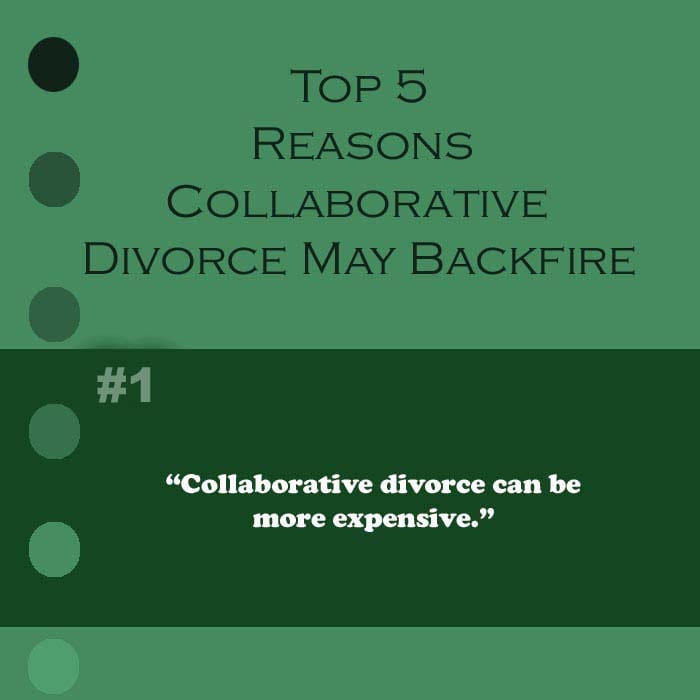Last week you may remember we outlined the top 5 reasons collaborative divorce can backfire. This week we are delving deeper into why a divorce using collaborative law can be more expensive. Remember, when you sign your collaborative law contract, you are agreeing that no matter what happens, you will not file anything with the court.
Collaborative law can work terrifically as long as both parties agree on what is fair, and if this is the case looking into an uncontested divorce or peaceful divorce might be the most cost effective option. The reality of divorce cases though is that often both sides can’t agree on what is “fair”. Often the parties’ respective attorneys no matter how experienced can’t even agree on what is fair.
For example, say the wife is being told by her lawyer that she is entitled to $1,500 a month in spousal support, but the husband is being told by his lawyer that he should only have to pay $800 a month.
If you go to court to have a judge decide this issue alone, you pay your attorney to prepare for court, and then for a few hours of court time to have the judge resolve this limited issue.
The idea of collaborative law is that the parties will hire neutral mediators to guide them towards a resolution. However, you have to pay that person for what usually amounts to several hours if not more of their time to try and calmly get the parties to agree on a number that this mediator thinks is reasonable. These mediator fees are often as much as, if not more, than you are paying your attorney. You still have to pay your attorney to prepare a case for the mediator, which is effectively the same preparation you would have paid your lawyer to simply go to trial. This process, while being billed as a cheaper solution to resolve the dispute, often turns out to be far more expensive than a simple temporary spousal support hearing would be.
Additionally, what happens if mediation fails? Often it is successful, but when it’s not, by having signed up for collaborative law, you have only two choices. Choice one is go back to the mediator again, in which you incur a second round of fees for the same service which is no more likely to be successful than the first time was. Or choice two is you fire your attorney and get a new one that can take you to court to help you get a final resolution to your case.
By choosing the second of these options, you are having to essentially start over by getting your new attorney up to speed on your case, which is a very expensive process. You are basically starting over right where you would have been if you had just gone with an attorney not signed into a collaborative process. As you can see you are now adding cost and additional time to the divorce process.
Tom Brasier is a family law attorney in Portland, Oregon and is also practices family law in SW Washington. He specializes in divorce, custody, spousal support, and restraining orders.
Give us a call toll free at 1 (855) 328-9108 or locally in the Portland Metro area at 1 (503) 855-4777, or feel free to e-mail us with any question or to set up a meeting.


